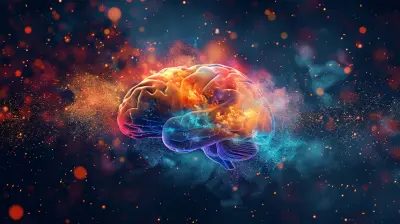19 December 2024
Feeling like you belong is one of the most basic human needs. It’s part of what makes us who we are, and it shapes our interactions with the world. But what happens when you feel disconnected or isolated? That's where group therapy can be a game-changer. This powerful therapeutic approach creates a unique space where individuals come together, not just to share their struggles, but to find a sense of belonging in the process.
In this article, we'll dive deep into how group therapy helps build that much-needed sense of belonging. We’ll explore the core elements that make group therapy so effective and how it can transform lives by fostering connections, trust, and community.

What is Group Therapy?
Before we get into the nitty-gritty, let's clarify what we mean by group therapy. Simply put, group therapy is a form of psychotherapy where a small group of people, usually led by a trained therapist, come together to discuss their issues and provide mutual support. The group typically consists of individuals who may be experiencing similar challenges, such as anxiety, depression, grief, or addiction.Unlike individual therapy, where the focus is solely on the therapist-client relationship, group therapy brings in the dynamic of collective support. This unique format allows participants to not only receive guidance from the therapist but also to learn and grow from each other.
Types of Group Therapy
Group therapy isn’t one-size-fits-all—it varies depending on the needs of the participants. Here are some common forms of group therapy:- Cognitive Behavioral Group Therapy (CBGT): Focuses on identifying and changing negative thought patterns.
- Support Groups: These are often peer-led and provide emotional support for specific challenges like addiction or grief.
- Psychoeducational Groups: These groups focus on education and coping strategies for managing mental health issues.
- Process-Oriented Groups: These groups emphasize interpersonal relationships and emotional expression.
Regardless of the type, the key benefit remains the same: group therapy offers a sense of belonging that individual therapy just can’t replicate.

How Group Therapy Fosters Belonging
1. Shared Experience: "You’re Not Alone"
One of the most significant ways group therapy fosters belonging is by providing a platform for shared experiences. No matter how isolated you may feel in your particular struggle, group therapy reminds you that you're not alone. Hearing someone else articulate something you've been experiencing can be a revelation. Suddenly, your personal suffering is no longer just yours—it's something others understand and relate to.Think of it like being lost in a dense forest. Alone, it can feel overwhelming and hopeless, but if you find a group of others navigating the same terrain, it becomes easier to find a path forward. That’s the power of shared experience—it makes the journey less daunting because you're walking it with others.
2. Validation from Peers
In group therapy, validation comes from more than just the therapist. The participants themselves offer each other validation, which can be incredibly empowering. When you open up and hear someone else say, "I feel the same way," it’s an acknowledgment that your feelings are real and valid.This validation helps dismantle the feelings of shame or guilt that often accompany mental health struggles. It’s like finally being able to take a deep breath after holding it in for too long. You realize that others see you, hear you, and accept you for who you are—flaws and all.
3. Trust and Vulnerability
Belonging isn’t just about being in the same room as others; it’s about feeling safe enough to be vulnerable. Group therapy creates an environment where trust can flourish. Over time, as participants share their stories, hopes, and fears, they begin to trust one another. This trust creates a bond that goes beyond superficial interactions.At first, opening up in a group setting may feel intimidating, but as trust builds, participants often find themselves able to express thoughts and emotions they’ve never shared before. Vulnerability in group therapy is like peeling back the layers of an onion—each layer reveals a deeper connection to others and, ultimately, to yourself.
4. Learning from Diverse Perspectives
In group therapy, the diversity of perspectives is one of its greatest assets. Everyone comes from different backgrounds, with different experiences and viewpoints. While this may initially seem like a challenge, it’s actually a strength.For example, someone in the group might share a coping mechanism that has worked for them, which you might never have considered. Or they could offer a fresh perspective on a problem you're struggling with. It’s like having a toolbox with multiple tools; you get to pick and choose what works best for you.
Each person’s unique lens enriches the conversation, fostering a deeper understanding of yourself and the world around you. This diversity not only enhances empathy but also strengthens the sense of belonging—you’re part of a community that respects and values different viewpoints.
5. Accountability and Encouragement
Belonging isn’t just about feeling connected; it’s also about feeling supported. Group therapy often comes with built-in accountability. The group members encourage each other to set goals, whether it’s healing from trauma, managing anxiety, or breaking free from addiction.Having a supportive group cheering you on can make all the difference. It’s like training for a marathon with a team versus running solo. The encouragement and accountability from the group push you to keep going, even when you feel like giving up.
6. A Sense of Purpose Within the Group
In group therapy, you’re not just a passive participant; you actively contribute to the healing of others. As you offer support, share your story, or provide a listening ear, you begin to realize that your presence matters. This sense of purpose can be incredibly grounding.We all want to feel like we’re making a difference, and group therapy offers that opportunity. By helping others, you help yourself. This sense of reciprocity strengthens the feeling of belonging—you’re not just taking; you're giving, too.
7. Breaking Down Walls of Isolation
Isolation is a breeding ground for negative thoughts and emotions. It’s easy to sink into the belief that no one else can understand what you’re going through. Group therapy shatters that illusion. By regularly attending sessions, you start to realize that the walls of isolation were never as solid as you thought.The routine of meeting with others, sharing openly, and receiving feedback slowly dismantles the mental barriers you've built. You start to see yourself not as an outcast but as part of a collective who understands, supports, and accepts you. Group therapy, in this way, becomes a bridge that connects you back to the world.

The Role of the Therapist in Building Belonging
Although group members play a significant role in fostering belonging, the therapist is the glue that holds everything together. Their job is to facilitate the conversation, ensure that everyone feels heard and respected, and guide the group through difficult emotional terrain.A skilled therapist can identify when someone is struggling to open up and gently encourage them to share. They can also navigate group dynamics to ensure no one dominates the conversation, making sure everyone has a chance to contribute. In this way, the therapist creates a safe and inclusive environment where belonging can truly take root.

The Long-Term Benefits of Belonging in Group Therapy
Building a sense of belonging in group therapy isn’t just a short-term fix—it has long-lasting benefits that extend beyond the therapy room. Studies show that individuals who feel a strong sense of belonging are more likely to:- Experience improved mental health
- Maintain long-term recovery from addiction or trauma
- Develop healthier relationships outside of therapy
- Build resilience in the face of life’s challenges
In essence, group therapy doesn’t just help you feel better in the moment; it equips you with the tools to maintain that sense of belonging in your daily life.
Conclusion: The Ripple Effect of Belonging
Group therapy is more than just a place to air your grievances or learn coping strategies—it’s a community. It’s where you realize that your struggles don’t define you, and that you’re not alone in facing them. The sense of belonging that group therapy cultivates can have a profound ripple effect, helping you reconnect with yourself and others in meaningful ways.So, if you’ve ever felt like you’re navigating life’s challenges alone, consider giving group therapy a try. It might just be the key to finding the belonging you’ve been searching for.









Grey Barrett
Group therapy offers a powerful reminder that we are not alone in our struggles. By sharing our stories and supporting each other, we cultivate a deep sense of belonging, fostering healing and growth together. Embrace the journey!
January 31, 2025 at 4:20 PM